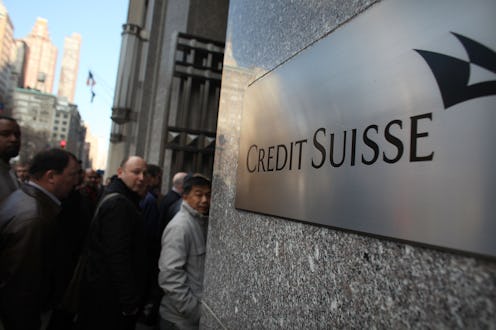News
Credit Suisse Will Face Mortgage Fraud Suit
At long last, you can finally say that a massively wealthy multinational bank had a bad day. As reported by CNBC Saturday, Swiss banking giant Credit Suisse will face a $10 billion lawsuit over alleged mortgage fraud leading up to the 2007 economic collapse, after New York Supreme Court Justice Marcy Friedman refused to throw out the case. It's a major victory for New York Attorney General Eric Schneiderman, who's staked much of his political reputation on bringing charges against violators within the banking industry.
According to Business Standard, the spokesperson for Eric Schneiderman's office, Elizabeth DeBold, hailed the decision as seeking "accountability for those who contributed to the near collapse of our economy." Companies that engaged in the behavior alleged of Credit Suisse — selling off junky mortgage-backed securities, and misleading customers both about the rigor of their review, and the health of the investments — are central to the catastrophic economic collapse of late 2007.
The legal wrangling isn't entirely over, of course. Things rarely are when you're talking about big banks and expensive, world-class legal teams money can buy — Credit Suisse has claimed that they'll appeal the decision — but for now, it's looking like this could head to trial, with a huge amount of money on the line.
Credit Suisse had argued they shouldn't be subject to the lawsuit, on the grounds that the state had missed a three-year statue of limitations window to bring the case. Schneiderman insisted that timeframe was actually six years, and it seem Justice Freidman agreed — she dismissed the bank's legal challenges as "without merit," according to USA Today.
This legal action has been in the pipeline for a long time already. Schneiderman's lawsuit, which advocates hope can be a blueprint for the fraud prosecution of major banks, was actually filed back in 2012, and has been kicking through the courts since then. The initial lawsuit made a pretty straightforward and compelling allegation: that Credit Suisse had convinced its customers they'd "carefully evaluated — and would continue to monitor — the quality" of the mortgage-backed securities, when in reality they were doing anything but.
In fact, defendants systematically failed to adequately evaluate these loans, and kept investors in the dark about the inadequacy of their review procedures.
It'll be fascinating to see how this case ultimately shake out, with as much activist passion and high-level financial power that's wrapped up in it. And for Schneiderman, it could be a career-maker or a career-breaker — few elected public officials have been as rhetorically tough on wrongdoing in the banking sector, and it's nothing short of vital for him to win this climactic showdown.
Image: Getty Images
